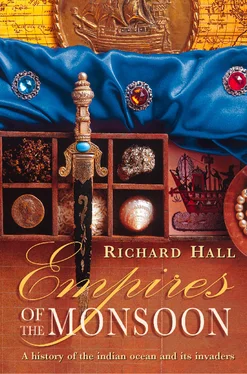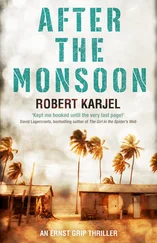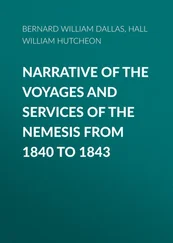Ibn Battuta’s visit to East Africa may also have been in response to an invitation from one of its leading citizens. The sultan of Kilwa, al-Hasan ibn Sulayman, had been to Mecca and spent two years in Arabia studying ‘spiritual science’. There was great prestige attached to having made the pilgrimage from somewhere as remote as Zanj; being able to welcome to one’s own town a learned stranger met while travelling would have been an additional cause for pride for the sultan.
Certainly, by his own account, Ibn Battuta seemed eager to reach Kilwa, for his description of a port where he stopped overnight on the way is perfunctory. He says it was Mombasa, but at once makes this unlikely by describing it as ‘an island two days’ journey from the coast’. This is clearly a confusion with some other place, perhaps Pemba, Zanzibar or Mafia. He remembered that the people of the island lived mainly on bananas and fish, augmented by grain brought from the coast, and that the wooden mosque was expertly built, with wells at each of its doorways, so that everyone who wished to go in could wash his feet, then rub them dry on a strip of matting supplied for the purpose.
His journey further southwards, past a coastline shrouded in mangrove swamps, brought Ibn Battuta at last to Kilwa. He described it as ‘amongst the most beautiful of cities, and elegantly built’. 4His first view of it, in early 1331, would have been as the ship entered the channel between the island and the mainland. Here was a superb natural harbour in which vessels of every kind could anchor or be run up on the beaches. Within sight further away were several smaller islands; a large settlement on one of these, called Songo Mnara, was also part of the sultan’s domain.
The main town of Kilwa, with its defensive bastions, stood well above the sea, directly facing the mainland. Many of its houses were closely packed together, but others were surrounded by gardens and orchards. In the gardens were grown all kinds of vegetables, as well as bananas, pomegranates and figs. The surrounding orchards provided oranges, mangoes and breadfruit. Almost the only foodstuff brought over from the mainland was honey.
When Ibn Battuta arrived, in February, there would have been no lack of lush vegetation, for it was the middle of the wet season, whose ferocious downpours are not easily forgotten. ‘The rains are great,’ he recalled. Yet at moments his memory utterly fails him, for he says that the city was entirely built of wood. That certainly was not the case by the time of his arrival, since the first stone mosque had been built on the island two centuries earlier. That mosque was later replaced by a much grander building with five aisles and a domed roof supported on stone pillars; it would have been the envy of all neighbouring ports, which had nothing to compare with it.
There was also a huge palace, to the north of the town, with many rooms and open courtyards. 5One of its features was a circular swimming pool. This building, superbly designed, followed the gentle fall of the ground to the edge of a cliff, below which boats could anchor. It was the home of the sultan and Ibn Battuta must have been received there. He would have dined off Chinese tableware, green celadon and blue-and-white porcelain adorned with chrysanthemums, peonies and lotus flowers: oriental ware was being imported in such quantities that many wealthier residents of Kilwa had taken to cementing them into the walls of their buildings as ornaments.
Kilwa would have needed vast amounts of African labour to build and maintain it. Many of the inhabitants were Zanj, ‘jet black in colour’ and with tribal incisions on their faces; most were slaves. There were also people of other nationalities to be seen in the busy streets, including visiting merchants and their servants. Lodgings with rooms for trading were provided close to the mosque for the merchants. But not all the merchants were Muslims: some were Hindus, who had sailed directly across the ocean from India with the north-east winter monsoon. They came from the great Gujarat port of Cambay and other trading centres further south along the Malabar coast. Apart from cloth and other manufactures, their ships carried rice, on which the profits were high.
According to Ibn Battuta, the sultan of Kilwa was constantly engaged in a ‘holy war’ with the Muli, the people of the mainland: ‘He was much given to armed sweeps through the lands of the Zanj. He raided them and captured booty.’ Put more bluntly, Sultan al-Hasan ibn Sulayman was busy with slave-raiding, but this did not seem in the least shocking in an age when slavery was an integral part of life. In Ibn Battuta’s eyes, the sultan, also known as Abu-al-Mawahib (Father of Gifts), was a man true to his beliefs, for he always set aside a fifth of the booty from his raids on the Zanj, and gave this to visiting sharifs , descendants of the Prophet. Confident of the sultan’s generosity, the sharifs came to visit him from as far away as Iraq. ‘This sultan is a very humble man,’ concluded Ibn Battuta. ‘He sits with poor people and eats with them, and gives respect to people of religion and Prophetic descent.’
The young Moroccan lawyer chose not to venture as far as Sofala, which a merchant told him was several weeks’ sailing further south. The uncertainties of the weather between Sofala and Madagascar, the land of the heathen Waqwaqs, meant that he risked being unable to sail back across the equator with the arrival of the south-west monsoon. There was also the danger of cyclones in the southern part of the ocean. So when the monsoon changed, Ibn Battuta did not linger, because in the middle months of the year there was a likelihood of violent storms. He boarded another ship, which headed across the open sea to Arabia; from there he went on by a roundabout route to India.
Ibn Battuta’s journey to East Africa in 1331, his first venture into the arena of Indian Ocean civilization, provides an eye-witness account of the coast after a gap of several centuries. For him it was the turning point of his career. From now on his lifelong urge to find out what lay beyond the next mountain, past the next town, across the next sea, was to make him, in Islamic eyes, the doyen of adventurers in pre-modern times.
EIGHT
Adventures in India and China
He who stays at home beside his hearth and is content with the information which he may acquire concerning his own region, cannot be on the same level as one who divides his lifespan between different lands, and spends his days journeying in search of precious and original knowledge.
—Al-Mas’udi, The Meadows of Gold
WHAT DISTINGUISHES the memoirs of Ibn Battuta from many other humdrum travel diaries is not merely his flair for recording what is bizarre, exotic or absurd, but also the way he lays bare his personality: at times he is swashbuckling and boastful, at others vulnerable and indecisive, then ready to laugh at his own folly in inviting misfortune. After six centuries, in translation from the Arabic, his individuality asserts itself. His capacity for self-revelation is closely related to a gift for capturing in one or two sentences the manners and customs of other people.
His description of life aboard the big Chinese trading junks, which were more and more to be seen sailing to Indian Ocean ports, epitomizes his skill. Ibn Battuta writes approvingly, echoing Marco Polo, about the amenities for merchants: ‘Often a man will live in his cabin unknown to any of the others on board until they meet upon reaching some town.’ These cabins, consisting of several rooms and a bathroom, could be locked by the occupants, ‘who would take along with them slave girls and wives’. He adds a glimpse of lower-deck life: ‘The sailors have their children living on board ship, and they grow lettuces, vegetables and ginger in wooden tubs.’
Читать дальше












